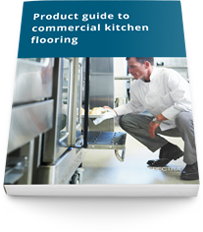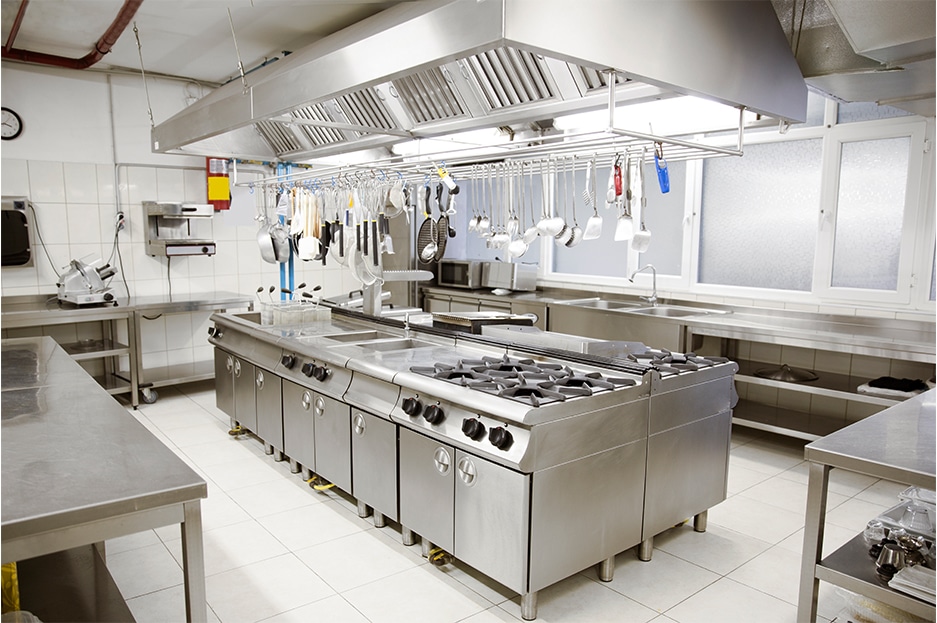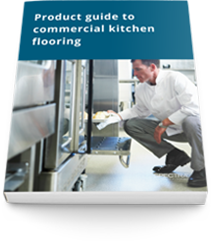A brief guide to commercial kitchen flooring
High temperatures, steady streams of water, constant spills, heavy industrial cooking equipment — commercial kitchen flooring goes through the ringer, every day. And the harsh demands don’t stop there. If you’re hunting for commercial kitchen flooring, you’ll need a material that can check off many boxes, including:
- Safety — a slip-resistant surface that improves traction and limits falls
- Sanitation — an easy-to-clean floor that won’t succumb to the daily application of harsh cleaning agents
- Infection control — a pre-treated material that limits microbial growth and infection
- Comfort — a floor that kitchen staff can comfortably stand on for hours at a time
- Aesthetics — something that fits your interior design scheme and, if applicable, creates ambiance while supporting your branding
So what materials meet all these needs? The two most popular flooring options for commercial kitchens are ceramic tile and vinyl flooring, while natural stone tile and brick are used in some specialty environments.
This blog post will provide a quick rundown of those flooring materials, but for a more in-depth look at our recommended commercial kitchen flooring products, be sure to download our product guide.

Choosing kitchen flooring materials for safety, durability and performance
Commercial kitchens have unique circumstances that make their floors a challenge. We created this product guide to highlight the three best available flooring material options for commercial kitchens.

Ceramic tile
Ceramic tile consists of a clay mixture formed into tiles and fired in a kiln. Ceramic comes in both porcelain and non-porcelain composites and is hard, durable and easy to clean, requiring minimal maintenance. For commercial kitchen settings, ceramic comes treated with a melted glass glaze that covers the surface to protect it from wear and tear, stains and water. Unglazed ceramic is porous and can’t withstand the rigors of a commercial kitchen. The glaze also allows ceramic to take on nearly any look, since manufacturers can create the glaze in nearly any design, including wood-grains and other natural patterns. If tiles break, you can replace them one at a time without shutting down the kitchen.
Learn more about ceramic tile.
Commercial vinyl flooring
Commercial vinyl flooring, also known as resilient flooring, is made from a mix of natural and synthetic polymers structured to create maximum durability. There are three types of vinyl flooring, vinyl composition tile (VCT), luxury vinyl tile (LVT) and sheet flooring.
VCT is a mix of limestone, filler, thermoplastic binder and color pigments made in sheets then cut into tiles. It uses layers of polish to protect its surface but requires regular stripping, waxing and re-coating, making it a poor option for commercial kitchen flooring.
LVT and sheet flooring, however, are much stronger options. Made predominately of limestone-base material with some composites, they have a digital graphic film layer applied on the base layer and a sealed, outer wear layer on top. These vinyl floors are durable, resist heat, water and stains, providing impressive design versatility. Manufacturers can print the digital graphic film layer in nearly any design, allowing LVT and sheet flooring to create any pattern and even be indistinguishable from natural materials, such as stone tile. Vinyl floors are by far the most cost-effective option for commercial kitchen flooring and offer many other great advantages:
- Newer types of LVT and sheet flooring can be pre-treated for infection control
- Vinyl is slip-resistant and one of the most common types of safety flooring
- Sheet flooring minimizes the number of seams in the floor, making life easier for kitchen staffs
- Vinyl flooring takes on the properties of its subfloor, so if installed over a cushy underlayment, it provides comfort for kitchen staff who spend hours standing and walking on the floor
- Maintenance is minimal, consisting of wet mopping, and most cleaning agents won’t hurt the surface
Learn more about commercial vinyl flooring.
Specialty materials: natural stone tile and brick
Natural stone tile and brick are the two most commonly used specialty materials for commercial kitchens. Both are more expensive than ceramic and vinyl flooring but are used in some cafés, delis and restaurants where the kitchen is in a publicly viewable space and represent a big part of the ambiance and branding. Stone and brick can provide premium looks and a warm, inviting sense of home. The hues in red brick can even subtly trigger hunger in restaurant patrons.
Natural stone tile is made from materials quarried from the earth. Each stone has unique characteristics, and some are better than others for commercial kitchens. If selecting natural stone, avoid polished surface tiles because they become slippery when wet. Honed or brushed materials give good traction, and denser stones, such as slate and granite, are more stain-resistant and easier to maintain. All natural stone tiles are porous and must be periodically sealed with a protective coat and require several daily washes.
Brick is durable yet porous, making it susceptible to water damage. However, with commercial sealers applied one or two times per year, it can resist stains and other hazards. Many owners also use additional wax treatments with brick, but wax needs to be stripped and reapplied periodically to prevent buildup.
Key considerations for materials and installation
Selecting materials is only part of the process; installation is just as important. At Spectra Contract Flooring, we’ve installed more than 350,000 commercial floors throughout the U.S. Here, we’ll pass along just a few useful insights from our experienced team.
- Instead of purchasing flooring directly from manufacturers, you can save money by sourcing materials through your flooring contractor, who can recommend the most cost-effective materials and negotiate better pricing with manufacturers.
- Have your flooring installer test your underlying concrete slab for any moisture issues. If left untreated, moisture can damage your floor and void its warranty.
- Proper installation is crucial. Your installer must pair flooring with its correct, manufacturer-recommended sub-base and underlayment materials — if there’s an air bubble underneath, tiles can crack and break.
- Some specialty flooring can require unique installations, not only to get it right, but also to meet the warranty. In some cases, we actually have crews train specifically to install specialty flooring.
- Work with your installer to keep extra tile available and plan for replacements as well as maintenance — most products come with some replacement and maintenance guidelines.
If you have any questions about commercial kitchen flooring or an upcoming commercial flooring project, contact us here or call any of our locations nationwide. You can learn more about our flooring installation services here.

A buyer’s guide to commercial kitchen flooring
Learn the differences between the best flooring materials available for commercial kitchens.
